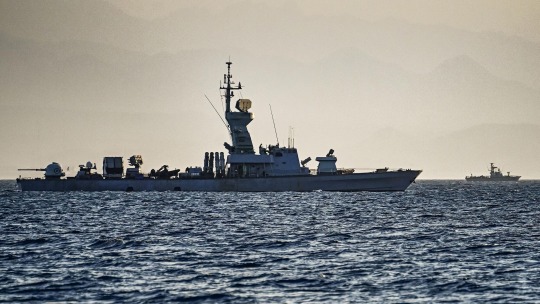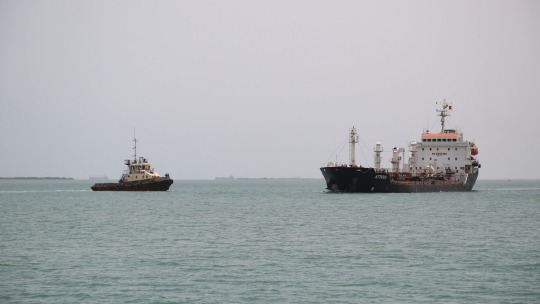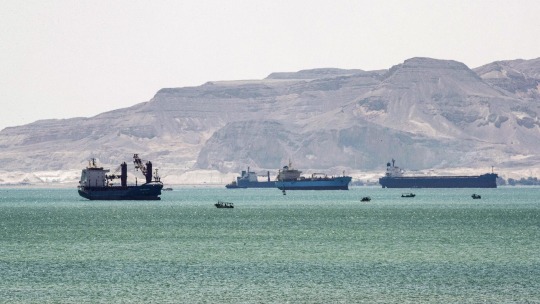#Qatari 🇶🇦 Foreign Ministry
Explore tagged Tumblr posts
Text
How Could Red Sea Standoff Affect Oil Supplies?

An Isra-helli Navy Missile Boat Patrols in the Red Sea off the Coast of Israel's Southern Port City of Eliat on December 26, 2023. © AFP 2023/Alberto Pizzoli
Ongoing Houthi attacks on Western trade vessels passing through the Red Sea have already prompted a spate of tankers to divert their course away from the area. Will the trend continue amid the current US-Houthi skirmish in the region? Sputnik explores.
Yemen's Houthis vowed to attack any ships associated with Israel until the Jewish state halts its military actions in the Gaza Strip in November.
This prodded US Secretary of Defense Lloyd Austin to announce the creation of a multinational operation to secure navigation in the Red Sea. Earlier this month, US and UK forces launched major strikes against Houthi positions to degrade the fighters’ ability to target commercial vessels. The standoff, however, shows no sign of abating.
Why is Red Sea So Crucial for Global Oil Deliveries?
The Suez Canal and the Bab el-Mandeb Strait at either end of the sea are major routes for energy shipping. Tankers coming from Persian Gulf countries, such as Iraq and Saudi Arabia, travel through the Red Sea to reach Europe and beyond.

US Jeopardizes Shipping in Red Sea - Hezbollah Secretary General! "Actions of the United States jeopardize navigation in the Red Sea, threatening the safety of even those ships not involved in the conflict," Nasrallah said during his speech broadcast by Al Jazeera. The US will not be able to stop the attacks on Israeli-related ships, Nasrallah said.
"[US President Joe] Biden and his accomplices are acting stupidly in their arrogance, thinking they can stop Yemenis by attacking Yemen. They have sent threats to Iran, but that will not help them deal with Yemen, because the Yemenis, like in Lebanon, make decisions on their own," Nasrallah said.
Between 7 and 8 Million Barrels Per Day (BPD) of crude oil and petroleum products were previously transported via the Red Sea. Up to 12% of global crude exports, and between 14% and 15% of exports of oil products, such as gasoline and diesel, typically travel through the Red Sea, according to data provider Kpler.
The main alternative route to the Red Sea goes around Africa via the Cape of Good Hope, adding about two weeks to trips and potentially increasing shipping rates by as much as $1 a barrel for crude and $4 a barrel for refined products, Goldman Sachs' estimates have shown.
How Did Oil Prices Change?
The prices of a barrel of Brent crude, the global oil benchmark, and West Texas Intermediate, the US oil benchmark, have barely moved since the beginning of the Red Sea tensions.
Currently, US crude oil is trading about $73 Per Barrel, as compared to average price tag of $82.49 Per Barrel in 2023. Brent crude futures traded 1.4% lower at $77.21 Per Barrel, while US West Texas Intermediate crude futures were down 1.0% at $71.69.
"The [oil] market basically doesn’t get as excited as it used to because it knows that most of these tensions don’t really, necessarily, lead to a reduction in supply," Homayoun Falakshahi, a senior oil analyst at Kpler, told CNN.

Red Sea Tensions ‘Sky-High,’ May Be Impossible to Contain Soon — UN Secretary General Antonio Guterres
At the same time, he suggested that the Red Sea crisis will last "for months," which may bring the price of Brent to past $80 per barrel in the near future. Falakshahi didn’t rule out that the price tag could rise as high as $85 a barrel over the next few weeks, and that it would surge higher only if the standoff escalated significantly.
Which Companies and Tankers Have Re-Routed?
Even though recent weeks saw a whole array of tankers take a longer route to avoid the Red Sea, the vessels are still reaching their customers, Falakshahi pointed out.
“It’s really mostly a crisis in the supply chain, we haven’t lost volumes [of oil]. You have some tankers that have to go around the Cape of Good Hope. But in the end, the volumes remain the same,” the analyst claimed.
US energy giant Chevron has meanwhile continued transporting crude through the Red Sea thanks to what its Chief Executive Michael Wirth called his company’s close cooperation with the US Navy’s Fifth Fleet.
In a separate development, the British oil major Shell suspended crude shipments through the Red Sea, about a month after British Petroleum (BP) paused transits across the region.
Wirth, for his part, warned that the Red Sea standoff poses serious risks to oil flows and that prices could change quickly if tensions continue. He voiced surprise that US crude oil was trading at about 73$ a barrel because the "Risks Are Very Real" amid the ongoing US-Houthi skirmish in the Red Sea.
"It’s a very serious situation and seems to be getting worse. So much of the world’s oil flows through that region that were it to be cut off, I think you could see things change very rapidly," Wirth argued.
Why are Russian Oil Shipments Unabated?
Russia's crude flows have been unhindered by the Red Sea standoff amid an increase in the country’s oil shipments through the region, according to tanker-tracking data obtained by the Bloomberg news agency.
Over the past four weeks, Russia’s crude shipments via the Red Sea have surged to around 3.43 Million Barrels Per Day, a 94,000-barrel increase in comparison with previous weeks, the data showed.

American ‘Losers’ Can’t Pass Through Bab el-Mandeb Strait, Yemen’s Houthis Say!
Currently Russian crude continues to pass through the Red Sea despite Houthi attacks in the area. The Ansar Allah (Houthi) movement earlier pledged it would target neither Russian nor Chinese vessels.
"Yemen’s Ansar Allah movement is attacking US and British ships in the Red Sea. As for all other countries, including Russia and China, their shipping is out of danger in the region," the movement’s spokesman Mohammed al-Bahiti told the Russian daily Izvestia. He underscored that the Houthis are ready to ensure the safe passage of Russian and Chinese ships via the Red Sea.

Maritime Safety in Red Sea Cannot Be Ensured Without Ending Fighting in Gaza — Qatar! The safety of ships in the Red Sea cannot be ensured without ending the war in the Gaza Strip, Qatari Foreign Ministry spokesman Majed Al Ansari said on Tuesday.
"The aggravation of the situation in Yemen and in the Red Sea region cannot be considered in isolation from what is happening in the Gaza Strip. It is impossible to ensure the safety of ships in the Red Sea by military means if the war in the Gaza Strip continues. If the war in the Gaza Strip ends, the situation in the region will also calm down," Al Ansari told a press conference.

Italy 🇮🇹 Halts Arms Supplies to Israel After War in Gaza Began! "Italy has stopped sending any kind of weapons to Israel since the beginning of the Gaza war. It's all blocked. The period when the most weapons were sent to Israel was during the premiership of [Former Italian Prime Minister Giuseppe] Conte. But with the outbreak of hostilities, we suspended all deliveries of weapons systems and military equipment of any kind," Italian Deputy Prime Minister and Foreign Minister Antonio Tajani said in an interview with Italian newspaper Quotidiano Nazionale, published on Friday.
— Sputnik International | Saturday January 20th, 2024 | Oleg Burunov
#World 🌎 | Russia 🇷🇺 | US 🇺🇸 | United Kingdom 🇬🇧 (UK) | Bastard Child of the US 🇺🇸 and the West 🇪🇺: Isra-hell | Yemen 🇾🇪 | Houthis Attacks#Red Sea | Red Sea Crisis#Qatar 🇶🇦#US Central Command (CENTCOM) | USS Laboon#Gaza Strip Palestine 🇵🇸 | European Union 🇪🇺 (EU) | Middle East#Qatari 🇶🇦 Foreign Ministry#Italy 🇮🇹
1 note
·
View note